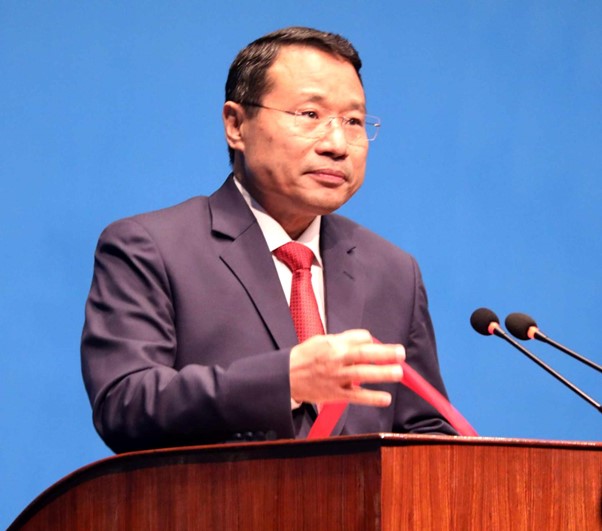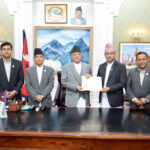Kathmandu, May 28:
Finance Minister Barshman Pun has started presenting the annual estimates of the government’s revenue and expenditure (budget) for the financial year 2081/82 at the joint meeting of the federal parliament.
Earlier today, the joint session of Parliament scheduled for 1 pm was postponed for two hours to address the demand of the main opposition, Nepali Congress that had been blocking the House demanding the formation of a parliamentary inquiry committee to look into alleged misappropriation of funds of financial cooperatives.
The deadlock in the parliament has ended after the major parties reached an agreement on the formation of the committee and its terms of reference.
After the joint meeting, both houses will hold separate meetings today.
Finance Minister Barshman Pun has started presenting the annual estimates of the government’s revenue and expenditure (budget) for the financial year 2081/82 at the joint meeting of the federal parliament.
Earlier today, the joint session of Parliament scheduled for 1 pm was postponed for two hours to address the demand of the main opposition, Nepali Congress that had been blocking the House demanding the formation of a parliamentary inquiry committee to look into alleged misappropriation of funds of financial cooperatives.
The deadlock in the parliament has ended after the major parties reached an agreement on the formation of the committee and its terms of reference.
After the joint meeting, both houses will hold separate meetings today.
The government has announced that the upcoming fiscal year 2081-82 BS (2024-25) will be a year of economic reforms. Presenting the budget estimates for the new fiscal year before a joint sitting of the Federal Parliament today, Finance Minister Barshaman Pun said that the focus will be on economic reforms. According to the Finance Minister, the budget aims to address long-standing challenges in the economy including an imbalance in the public finance, increasing size of public debt, limited capital expenditures, and the lack of revenue collection as per the targets. Such initiative will be taken through the implementation of fresh programmes for economic reforms.
The government is to legalize marijuana cultivation and consumption for medicinal purpose. Presenting the government’s budget estimates for coming fiscal year 2024/25 in the joint meeting of the parliament today, Finance Minister said necessary laws would be formulated for commercial production of marijuana in the country. “Legal arrangements will be made for commercial cultivation of marijuana for medical use “, he said.
The government has set five strategies and five priorities of the budget and outlined five strategies for economic reforms in the upcoming fiscal year. According to the budget estimates for the upcoming fiscal year presented by Finance Minister Barshaman Pun before a joint sitting of the Federal Parliament today, increasing production, productivity, and employment, securing investment and growth and accelerating economic activities by boosting the morale of the private sector, achieving the human resource development, alleviating economic disparities and poverty though the balanced and just mobilization of resources and increasing the effectiveness of the public service delivery have been presented as the five objectives of the budget for the new fiscal year.
Similarly, economic reforms and the encouragement of the private sector, construction of industrial infrastructure such as agricultural energy information technology, development of education, health-like social sector, promotion of inclusion, social security, and good governance, and the enhancement of public service system are cited as the five priorities of the government for the upcoming fiscal year. Structural reforms, improvement in the business environment, reforms in the public finance system, financial sector reforms, and reforms in public administration are mentioned as the five strategies for economic reforms. As the budget announced, a high-level task force will be formed to provide submissions to the government for structural reforms of the economy. Likewise, the government pledges to enact favourable policies, complete country rating, and eliminate dual taxation to promote an environment conducive for business in the country.
The federal government is to allocate 567 billion rupees to the provincial and local governments (PLGs) in the coming financial year 2024/25. This will be made through fiscal transfer and revenue sharing from the federal budget. According to the budget statement read out by Finance Minister Barshman Pun in the Parliament today, on the recommendation of the National Natural Resources and Fiscal Commission (NNFRC), the federal government has allocated Rs 60 billion for the provinces and Rs 88 billion for the local level towards the fiscal equalization grants.
Likewise, conditional grant worth Rs.25.84 billion has been earmarked for the provinces and Rs.28.88 billion for the local level. Another 6.2 billion rupees have been allocated to the province and 7 billion rupees to the local level towards supplementary grants. In addition, 4.4 billion rupees have been allocated for the province and 8.5 billion rupees for the local level as special grant. Finance Minister Pun noted that arrangements will be made to transfer conditional, supplementary and special grants based on performance. The government estimates that 159 billion rupees will be transferred to the provincial and local levels as part of revenue sharing.
The government targets to enhance the capacity of the national grid by increasing its capacity to 4500 megawatts by the upcoming fiscal year. Unveiling the budget for the fiscal year 2081-82 BS (2024-25) before the joint sitting of the Federal Parliament today, Finance Minister Barshaman Pun said 900 megawatts of electricity will be added to the national grid in the upcoming fiscal year. As the government estimates, the per capita consumption of electricity will be increased from 380 kilowatts to 450 kilowatts. Similarly, the government aims to export Nepal’s electricity to Bangladesh as well from the upcoming fiscal year.
As of now, Nepal exports power to India only. Similarly, the government has prioritized the promotion of reservoir-based projects to address the power needs during winter, pledging to implement the construction of the 1200 megawatts Budhigandaki Hydroelectricity Project. Similarly, the government pledged to initiate the development of 625 megawatts Dudhkoshi, 417 megawatts Nalgadh, and the 280 megawatts Naumure projects. The government plans to launch the development of 77.5 megawatts Ghunsha Khola (Stream) and 70.3 megawatts Simbua Khola hydroelectricity projects by securing investment of Nepalis in foreign employment.
Under the People’s Hydroelectricity Programme, the government aims to launch the construction of 106 megawatts of Jagadulla, 99.9 megawatts of Tamakoshi V, and 210 megawatts of Chainpur Seti Hydroelectricity Project. In addition to these, the government has announced to determine the investment framework for the Sunkoshi III Hydropower Project and begin the feasibility study for the 10,800 megawatts Karnali Chisapani Hydropower Project. The government has announced to pursue a goal of promoting clean and renewable energy to replace the use of traditional energy to achieve the goal of zero carbon emission by 2045.
It has announced to pursue a policy of encouraging the production, storage, and use of green hydrogen, pledging to conclude the construction of the Dhalkebar-Inaruwa Transmission Line and Barhabise-Khimti-Lapsifedi transmission line within the next fiscal year. It aims to initiate the construction of the Seti Corridor, Bheri Corridor, and the Budhigandaki Corridor Transmission Lines and to conclude the construction of the New Butwal-Gorakhpur Transnational Line and, allocate the budget for the construction of the Inaruwa-Poornia, Dododhara-Bareli Transmission Line. The Finance Minister informed the house that the government has allocated a budget of Rs 50 billion 740 million to the energy sector in the upcoming fiscal year.
(RSS)




